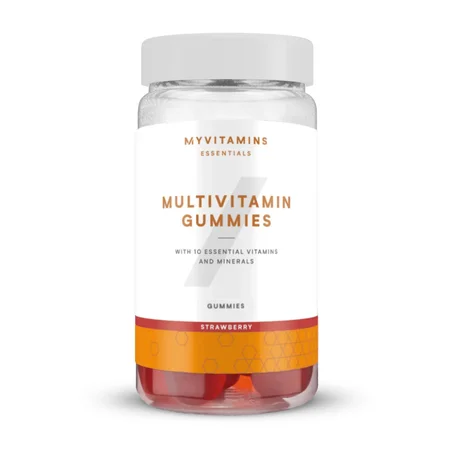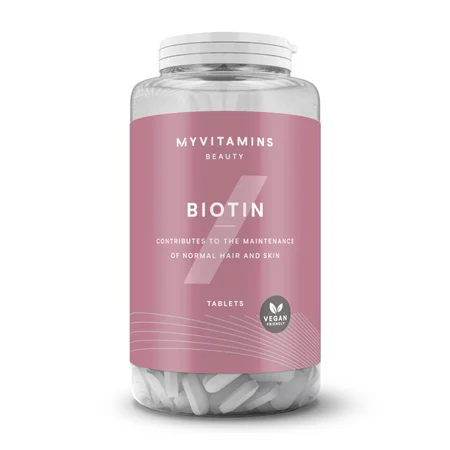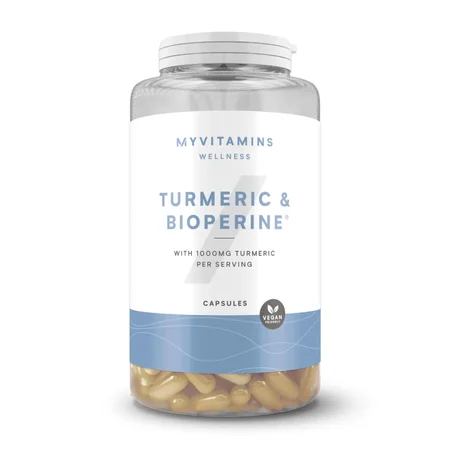6 Benefits Of Turmeric | What Is It? How Much To Take?
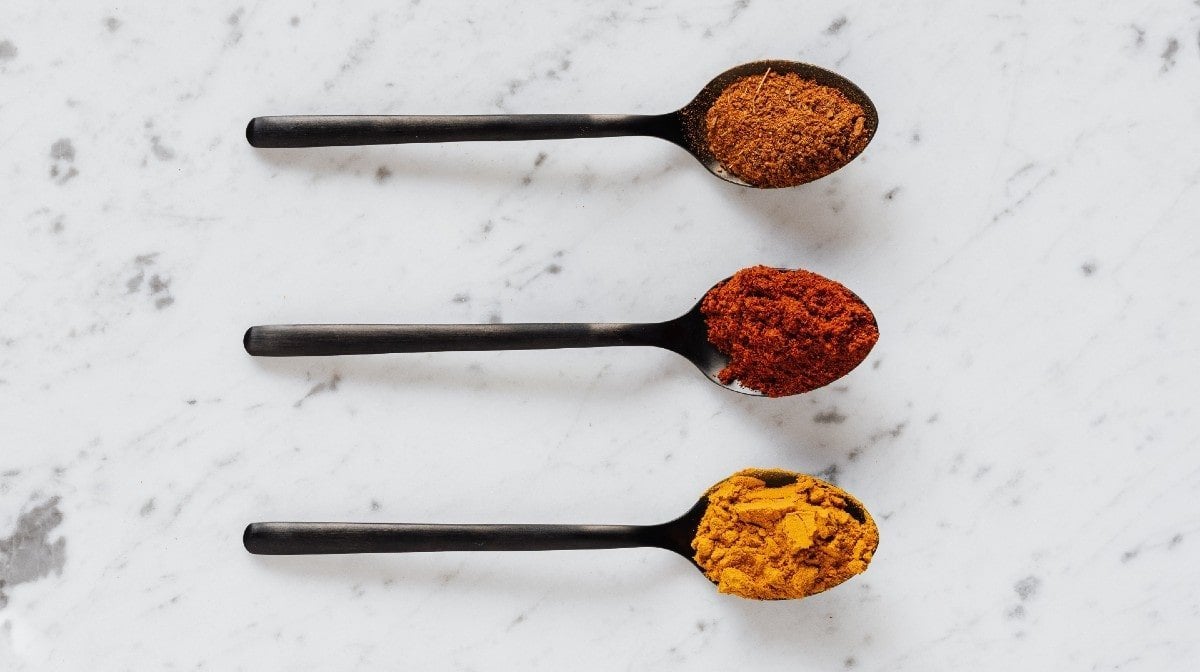
Turmeric is a popular spice that is often used in curries and other savoury dishes. Used in many Asian cultures and known as “the spice of life” or “the golden spice”, it has become popular worldwide. Turmeric benefits us in lots of ways, and the early research into this golden wonder is promising, so this article will dive into everything we know about turmeric.
As well as giving curry its yellowish colour, turmeric also has powerful plant-based compounds called curcuminoids. Curcumin is the active ingredient in turmeric that is popular in research for its potential medicinal uses. However, curcumin makes up only about 3% of turmeric by weight, so you will likely need a supplement to reap the health benefits.

What are the Health Benefits of Turmeric?
Turmeric is a natural anti-inflammatory and antioxidant, which leads to all of the research surrounding its potential health benefits. While many of these areas of research are ongoing, it has been clear that the chances of toxicity (or negative effects) of adding turmeric are very low.
1. Turmeric may help with pain from arthritis
Research has shown improvement in knee pain from osteoarthritis after regular supplementation of curcuminoids.
2. Turmeric may improve blood sugar levels
While studies into turmeric improving health outcomes for those with diabetes and obesity have not been conclusive, one study did show improved blood glucose control in pre-diabetic subjects, which could play a role in prevention.
This is a popular area of research and while there has not been a lot of clinical evidence, having turmeric in the diet has the potential to improve blood sugar related health concerns.
3. Turmeric may fight inflammation2
While many chronic diseases are related to inflammation, the specific impact of turmeric has not been proven. It has been used for many years as a medicinal herb in certain cultures.
However, the bioactive phytochemicals (plant compounds) in turmeric make it an easy choice to include to help prevent the damage that inflammation can do to your body.
4. Turmeric is a proven antioxidant
The curcuminoid compounds of turmeric are chemically proven to have antioxidant properties.
Turmeric has also developed a bit of a reputation as a superfood, which can only mean good things. Learn more about superfoods here.
5. Turmeric may support heart health
Some studies have focused on cholesterol and triglyceride levels and their response to curcumin supplementation. While the research in this area is still ongoing, cardiovascular disease is a major concern for many who may benefit from adding turmeric to their diet.
6. Turmeric may help improve mental health
There have been studies focused on curcumin supplementation for those with depression and anxiety related disorders. While some studies saw improvements, they were only done over short periods of time and more research needs to be done to support this potential benefit,
Turmeric Dosage
Turmeric is clearly a powerful spice with many potential health benefits. While there is no general guidance on exactly how much turmeric you should take to reap the benefits, you could consider the amounts used in research studies as guidance.
For arthritis, most studies used 500 mg curcumin twice a day for at least 2 months. 2 For improved glucose control and heart health, one study provided patients with 2 grams per day (4, 500mg supplements) 2 For fighting inflammation and antioxidant properties, dosage ranged from 180mg to 1.5g daily 2 For depression and anxiety, a common dosage in studies was 500mg twice a day for several months 5
Take Home Message
While turmeric and its curcuminoid compounds have many promising health benefits, the studies are limited and recommended dosages vary. However, the golden spice (turmeric) has been shown to have many antioxidant and anti-inflammatory effects - showing again how powerful a healthy diet with plant-based nutrition can be to prevent disease and preserve your health.
READ THESE NEXT:
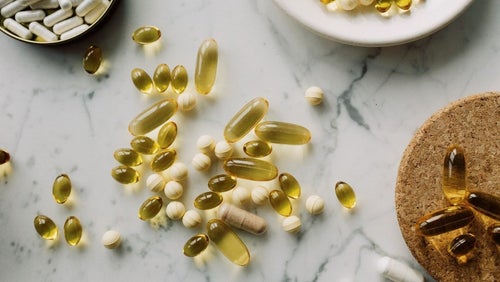
5 Amazing Health Benefits Of Cod Liver Oil
It's one of the longest standing supplements for a reason.

Do I Need To Ditch Alcohol To Lose Weight?
Don't throw your beer away just yet...

Bulking Diet: An Introduction To A Hardgainer Diet
Get over a gaining slump with these tips and tricks for the hardgainer diet.

Claire is a Registered Dietitian through the Academy of Nutrition and Dietetics and a board-certified Health and Wellness Coach through the International Consortium for Health and Wellness Coaching. She has a Bachelor of Science in Biology and a Master’s degree in Clinical Dietetics and Nutrition from the University of Pittsburgh.
Talking and writing about food and fitness is at the heart of Claire’s ethos as she loves to use her experience to help others meet their health and wellness goals.
Claire is also a certified indoor cycling instructor and loves the mental and physical boost she gets from regular runs and yoga classes. When she’s not keeping fit herself, she’s cheering on her hometown’s sports teams in Pittsburgh, or cooking for her family in the kitchen.
Find out more about Claire’s experience here.
- Tayyem, R. F., Heath, D. D., Al-Delaimy, W. K., & Rock, C. L. (2006). Curcumin content of turmeric and curry powders. Nutrition and cancer, 55(2), 126-131.
- Singletary, K. (2020). Turmeric: potential health benefits. Nutrition Today, 55(1), 45-56.
- Tilak, J. C., Banerjee, M., Mohan, H., & Devasagayam, T. P. A. (2004). Antioxidant availability of turmeric in relation to its medicinal and culinary uses. Phytotherapy Research: An International Journal Devoted to Pharmacological and Toxicological Evaluation of Natural Product Derivatives, 18(10), 798-804.
- Kumar, A., Dora, J., & Singh, A. (2011). A review on spice of life Curcuma longa (turmeric). Int. J. Appl. Biol. Pharmaceut. Tech, 2, 371-379.
- Ng, Q. X., Koh, S. S. H., Chan, H. W., & Ho, C. Y. X. (2017). Clinical use of curcumin in depression: a meta-analysis. Journal of the American Medical Directors Association, 18(6), 503-508.ne
